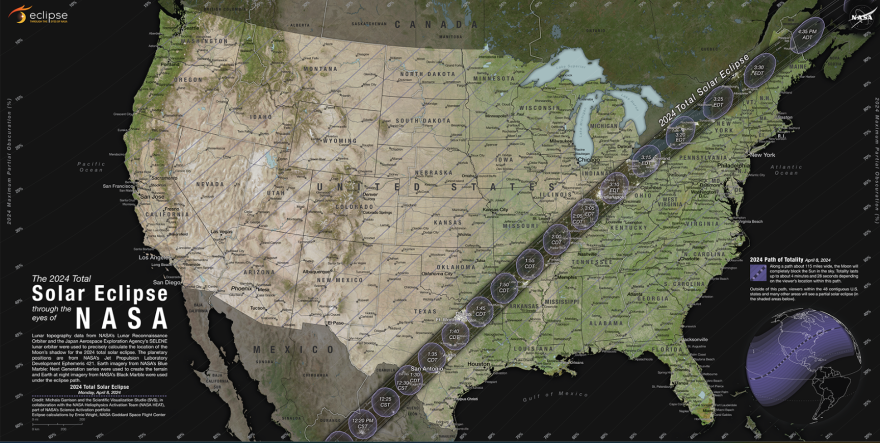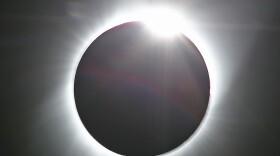A total solar eclipse will appear in the sky on April 8, 2024, and Michiganders have a great chance to see it. A total solar eclipse occurs when the moon passes right over the sun in broad daylight and the last time one happened was in 2017. According to NPR, the path of the eclipse stretches from Texas to Maine, with an estimated 31 million people living in that belt.
According to NPR, “NASA estimates that 99% of people in the U.S. will be able to see a partial or total eclipse in just a few weeks.”
Each person’s view of the eclipse will vary based on their location and time zone, but you can check your chances with NASA’s solar eclipse guide.
There are a variety of ways to see this year’s eclipse on the ground or in the sky. Delta Air Lines offered multiple flights during peak viewing times for the eclipse. Flight 1218 from Austin, Texas to Detroit sold out within 24 hours, according to NPR.
But for those who didn’t get to the flight in time, viewing the eclipse from the ground should be a great experience, too. Fred Espenak, a retired astrophysicist from the NASA Goddard Space Flight Center, said that the best way to see the eclipse is from the ground with a cloud-free sky.
“From the ground you can look in every direction and get the full experience of totality," Espenak told NPR.
Where can I view the eclipse in Michigan?
Unfortunately, most of Michigan won't be in the path of totality, but those in Southeast Michigan, specifically Monroe County, will have the best chance for a full totality experience. Luna Pier, which will reach totality at 3:13 p.m. will be a brief experience, with totality lasting just 19 seconds.
If you can't make it there, luckily, there will be several options for viewing parties in places where you can experience the eclipse:
- Sterling State Park viewing party
- River Raisin National Battlefield Park
- Kackleberry Farms
- Cranbrook Institute of Science
- Ford House/Michigan Science Center
- Detroit Riverfront Conservancy
- Lake Hudson Recreation Area
For those willing to travel a bit more, Toledo, Ohio, and other areas in Ohio and Indiana will offer a bit more time to experience it. Toledo will reach total darkness at 3:12 p.m. and will stay in that darkness for over a minute. A longer jaunt to Cleveland gives you a chance to experience four minutes of solar eclipse darkness.

Indiana's Department of Natural Resources provides a handy list of times you can experience totality via Indiana DNR locations.
Totality is the period of time when the moon is fully blocking the sun, and some places will experience it longer than others. Michelle Nichols, who directs public observing programs at the Adler Planetarium in Chicago, encouraged anyone interested in viewing the eclipse to make the trip for it.
“I would never tell someone, '99% is close enough.' That's definitely not the case with a solar eclipse,” Nichols told NPR. “Drive those last few miles to get into the path of totality. People go to total eclipses to get the full experience, and 99% will not get you the full experience.”
How can I safely watch the eclipse?
And for anyone planning to view the eclipse, there’s one more crucial step to enjoying it safely–eclipse glasses. Eclipse glasses are specially designed with filters to only let in between 0.001% and 0.00005% of visible light. Viewing a solar eclipse, or the sun, without proper eye protection even for a short time could harm your eyes and risk permanently damage your retina, according to the American Academy of Ophthalmology.
The eclipse can be viewed safely by using things like a pinhole projector, camera obscura, or even a colander to cast an image of the eclipse onto a wall or the ground.
However, never look at the eclipse through a telescope, binoculars, or an unfiltered camera–even with eclipse glasses. The only safe time to look at the eclipse without proper eye protection is during totality, the up-to-four-minute period of time when the sun is blocked by the moon.
Eclipse glasses are pretty easy to find, but beware of ones that are not strong enough. The American Astronomical Society has recommended eclipse glasses and other types of solar viewers to purchase for eclipse-viewers.
Experts recommend checking your glasses before the eclipse–and not against the sun.
“The way I like to think about it is if I put on the glasses and I can see anything that's not the sun, then they're not dark enough,” Angela Speck, chair of the department of physics and astronomy at the University of Texas at San Antonio, told NPR. “That's a quick and dirty way to kind of judge it."






